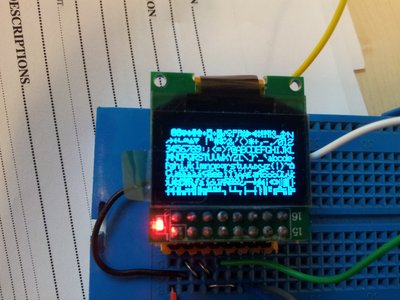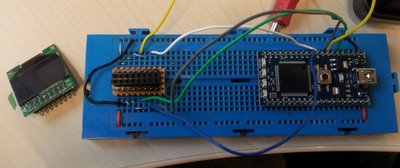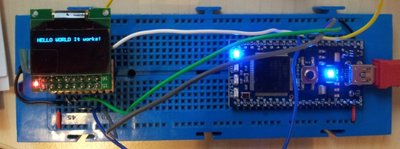SPKDisplay - A mbed display class and processing imaging tools for 128x64 OLEDs using the SSD1305 driver, connected via SPI. This variant drives a Unigraphics oled on the same driver but in page mode. Includes a simple 5x7 ascii font
Fork of spk_oled_ssd1305 by
OLED driver and demo for Univision oled display 128x64.

Modified Toby Harris' code to run page mode addressing in 4 wire SPI on the Univision UG-2864HSWEG01 128X64 unit - often found for sale on ebay. That's where I got mine anyhow.
Wiring this was fairly straightforward but you really do have to ground all the unused pins EXCEPT for number 8 to get it to work.
Here's the layout - I made a little carrier using a 2x8 connector and a couple of headers mounted on a small piece of stripboard. You can see all the wire links that are used to ground the unused pins. It was pretty awkward setting the display to run in 4 wire spi - had to desolder and resolder three smd o ohm links on the back o fhte pcb - ended up using a microscope to see them.

Here is the output of the demo code.

In page mode the display is effectively divided up into 8 horizontal strips, each 8 pixels high so lends itself nicley to displaying text in a 5x7 font. I've included the 5x7 lcd font in the code below.
Code
Import programunivision_oled
driver demo for univision oled dispaly
#include "mbed.h"
#include "4spi_oled_ssd1305.h"
/* re writtten to cope with teh ssd1306 driven oled UG-2864HSWEG01 from univision
wiring for test circuit
OLED pins -FUNCTION-------MBED PINns
1 ----3.3V--- Vout (p40)
2 ----0.0V--- GND (p1)
3 ----------- GND (p1)
4 ----------- GND (p1)
5 ----------- GND (p1)
6 ----------- GND (p1)
7 ----------- GND (p1)
8 ----------- N/C
9 ----D1---- mosi (p5)
10 ---D0------sck(p7)
11 ----------- GND (p1)
12 ----------- GND (p1)
13 ---DC------ p10
14 ---RES----- p9
15 ---CS------ p8
*/
DigitalOut myled(LED1);
// Create object and load font
//SPKDisplay( mosiPin, clkPin, csPin, dcPin, resPin, Serial *debugSerial)
SPKDisplay screen(p5, p7, p8, p10, p9);
int main()
{
char msg[22];
sprintf(msg," ");
// 01234567890abcdefghij
int i=0;
while(1==1) {
myled=1;
// nice logo output
screen.welcome();
wait(3);
wait(2);
for(i=0; i<5; i++) {
myled=0;
screen.inverse();
wait(1);
screen.normal();
myled=1;
wait(1);
}
screen.fontdemo();
myled=0;
wait(5);
screen.clearBuffer();
screen.sendBuffer();
myled=1;
wait(0.5);
myled=0;
wait(0.5);
for(i=0; i<8; i++) {
sprintf(msg,"HELLO WORLD %d",i);
screen.textToBuffer(msg, i);
screen.sendBuffer();
screen.clearBuffer();
myled=1;
wait(1);
}
}
}
spk_oled_screenByteMaker--processing.h
- Committer:
- tobyspark
- Date:
- 2012-04-15
- Revision:
- 2:8187d69071f8
- Parent:
- 1:dd3faa2ab1dd
- Child:
- 3:ade83210ecf6
File content as of revision 2:8187d69071f8:
// OLED display using SSD1305 driver
// Copyright *spark audio-visual 2012
//
// This library is free software; you can redistribute it and/or
// modify it under the terms of the GNU Lesser General Public
// License version 3 as published by the Free Software Foundation.
int w = 132;
int h = 64;
int scaleFactor = 10;
PImage imgPixel;
color white = color(255, 255, 255, 255);
color black = color(0, 0, 0, 255);
void setup()
{
size(w*scaleFactor, h*scaleFactor);
imgPixel = loadImage("spk_dvimxr_screen.png");
noSmooth();
}
void draw()
{
background(0);
image(imgPixel, 0, 0, w*scaleFactor, h*scaleFactor);
}
void mouseDragged()
{
int x = mouseX/scaleFactor;
int y = mouseY/scaleFactor;
imgPixel.set(x, y, white);
}
void mousePressed()
{
int x = mouseX/scaleFactor;
int y = mouseY/scaleFactor;
if (imgPixel.get(x, y) == white)
{
imgPixel.set(x, y, black);
}
else
{
imgPixel.set(x, y, white);
}
}
void keyPressed()
{
println("{");
for (int page = 0; page < 8; page++)
{
for (int i = 0; i < w; i++)
{
byte theByte = 0;
for (int j = 0; j < 8; j++)
{
if (imgPixel.get(i, (page*8)+j) == white)
{
theByte += pow(2, j);
}
}
print("0x" + hex(theByte, 2));
print(", ");
}
println();
}
println("}");
}

